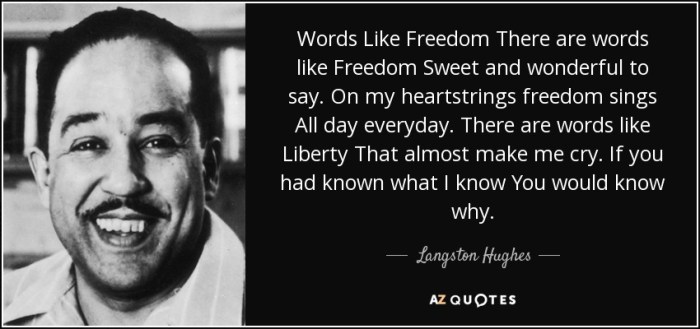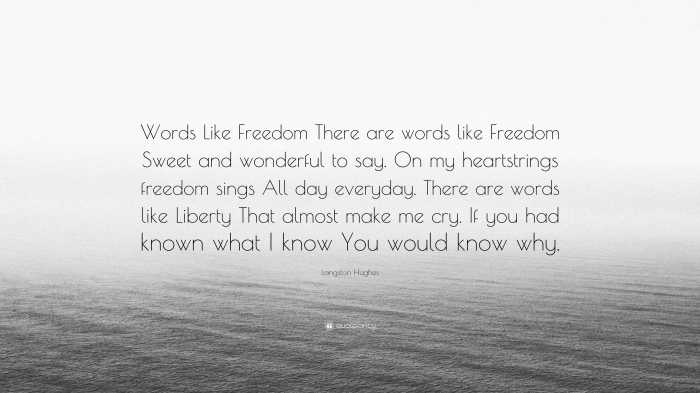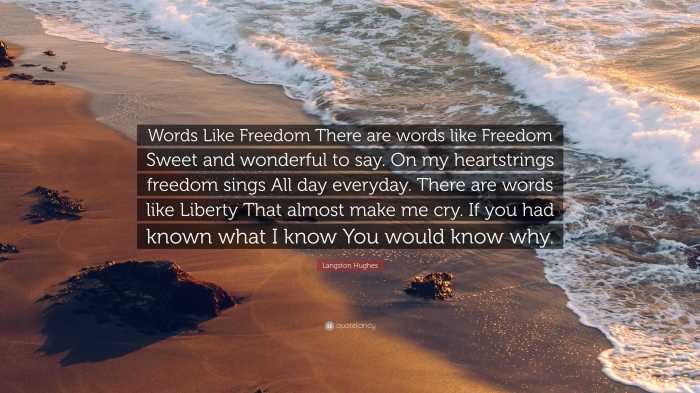Words like freedom langston hughes – With words like freedom, Langston Hughes painted a vivid canvas of the African American experience during the tumultuous 20th century, crafting a poetic masterpiece that resonated deeply with his audience and continues to inspire generations.
Hughes’ “Words Like Freedom” is a powerful testament to the resilience and determination of a people facing adversity, using language as a weapon against oppression and a beacon of hope for liberation.
Historical Context of “Words Like Freedom” by Langston Hughes: Words Like Freedom Langston Hughes
Langston Hughes (1902-1967) was a prominent figure in the Harlem Renaissance, a cultural and artistic movement that celebrated African American culture and identity in the 1920s and 1930s. During this period, Hughes wrote “Words Like Freedom” amidst a tumultuous social and political climate.
The Great Depression, which began in 1929, had a devastating impact on the African American community, exacerbating poverty and unemployment. Simultaneously, the rise of fascism in Europe cast a shadow over the world, threatening the rights and freedoms of marginalized groups.
These events deeply influenced Hughes’s writing, leading him to explore themes of oppression, resistance, and the search for identity in “Words Like Freedom.”
Poetic Form and Structure
The poem “Words Like Freedom” consists of five stanzas, each containing four lines. The rhyme scheme follows an ABAB pattern, with the second and fourth lines of each stanza rhyming.
The poem’s meter is predominantly iambic tetrameter, meaning each line contains four pairs of unstressed and stressed syllables. This rhythmic pattern creates a sense of movement and energy, enhancing the poem’s emotional impact.
Hughes employs repetition, imagery, and symbolism to convey his message. The repetition of the phrase “words like freedom” emphasizes the power and significance of language in the struggle for liberation.
Themes and Motifs

The major themes explored in “Words Like Freedom” include:
- Freedom:The poem celebrates the aspiration for freedom and liberation, both personal and collective.
- Oppression:Hughes confronts the oppressive forces that limit the lives of African Americans, such as racism, poverty, and discrimination.
- Identity:The poem explores the search for identity and self-expression within a society that often marginalizes African Americans.
Hughes uses language as a tool to convey these themes, employing metaphors, similes, and personification to create vivid and evocative imagery.
Literary Devices and Techniques
Hughes employs several literary devices to enhance the poem’s imagery and emotional impact:
- Metaphors:“Words like freedom” is a metaphor that equates language with the pursuit of liberation.
- Similes:“Like a song that swells” compares the power of words to the emotional impact of music.
- Personification:“The world is too big to hold down” attributes human qualities to the world, suggesting its oppressive nature.
Hughes also uses contrast and juxtaposition to highlight the tension between freedom and oppression, such as in the lines “I hear the marching feet of progress / And the groan of chains.”
Symbolism and Imagery

Hughes employs symbols and images to create a vivid and evocative picture of the African American experience:
- Words:Words are symbols of freedom and resistance, representing the power of language to challenge oppression.
- Chains:Chains symbolize the physical and psychological barriers that limit African Americans’ freedom.
- The world:The world is a symbol of both oppression and possibility, representing the challenges and opportunities that African Americans face.
These symbols and images contribute to the poem’s overall themes of freedom, oppression, and identity.
Impact and Legacy

“Words Like Freedom” has had a profound impact on the Harlem Renaissance and beyond:
- Harlem Renaissance:The poem became an anthem for the Harlem Renaissance, inspiring other artists and writers to explore themes of freedom and liberation.
- Later generations:“Words Like Freedom” has continued to inspire writers, musicians, and activists, becoming a symbol of the struggle for social justice.
- Contemporary society:The poem remains relevant today, resonating with individuals and groups fighting for freedom and equality.
“Words Like Freedom” is a testament to Langston Hughes’s poetic genius and his unwavering commitment to social justice.
Expert Answers
What is the historical context of “Words Like Freedom”?
The poem was written during the Harlem Renaissance, a period of cultural and artistic flourishing among African Americans in the 1920s and 1930s. It reflects the social and political climate of the time, marked by racial segregation, economic hardship, and the rise of fascism.
What are the major themes explored in “Words Like Freedom”?
The poem explores themes of freedom, oppression, identity, and the resilience of the African American community in the face of adversity.
How does Hughes use language to convey these themes?
Hughes uses vivid imagery, repetition, and symbolism to create a powerful and evocative picture of the African American experience. His use of language is both lyrical and accessible, allowing his message to resonate with a wide audience.